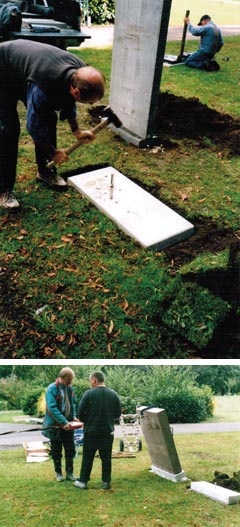The soil conditions in which NAMM tests memorial ground anchor fixing systems has been brought into question by Anton Matthews, the maker of the StoneSafe alternative to ground anchor fixings.
He has referred the matter to Trading Standards Officers and is awaiting a reply.
In Annex F of BS8415 for specifying memorials in cemeteries, the revised edition of which was published at the end of April (see NSS May issue), soil conditions for testing memorials are specified as being medium sand and gravel. In Northampton cemetery, where NAMM carries out its tests, the soil does not meet this criteria, says Anton.
The idea of testing fixings in a specified soil condition is that the test is fair, equitable and repeatable for all fixings. Anton believes many ground anchor fixing systems would fail in the soil conditions specified, while StoneSafe would pass.
There is some resistance to using the StoneSafe fixing system because, according to Anton, it costs £15 more and adds 15 minutes to the time it takes to install a memorial.
Anton’s claims about the soil conditions are supported by David Quinn, previously Development Officer with the British Register of Accredited Memorial Masons (BRAMM), an alternative register of trained fixers to the NAMM National Register of Qualified Memorial Fixers. He is an A1 Assessor for BRAMM, assessing the fixing of memorials by memorial masons in order that they can be included on the BRAMM.
He told NSS: “From my perspective, I would say he [Anton] has a very sound reason to complain about the soil conditions.”
The National Association of Memorial Masons (NAMM) has written a report on BS8415 for Natural Stone Specialist readers. To read it in full, click here. It includes details of the development of the tests for fixing memorials.
In the report, NAMM says: “It is worth noting that since the introduction of the British Standard in 2005, and since the promotion and use of approved fixing systems have become compulsory, no serious injuries or accidents have been reported.”

